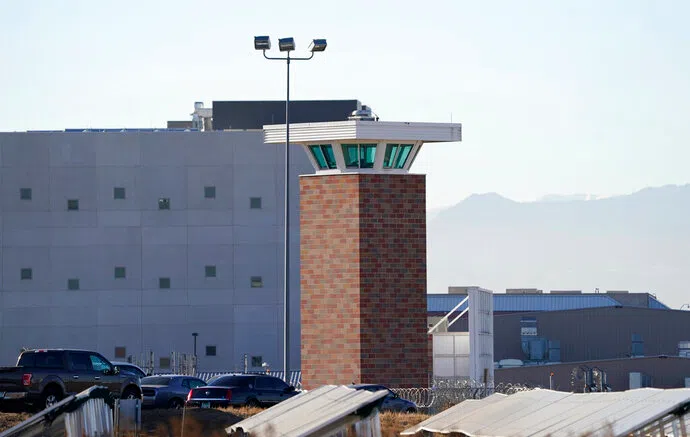
The guard tower stands near the Colorado Department of Corrections Denver Reception and Diagnostic Center Tuesday, Dec. 8, 2020, in east Denver. Amber Johnson of Fayetteville, Ark., is fighting for vaccination against the coronavirus for her 63-year-old father, Ronald, who is an inmate in the prison. (AP Photo/David Zalubowski)
DENVER (AP) — Amber Johnson is terrified her 63-year-old father will get the coronavirus. He has high blood pressure, asthma and is pre-diabetic, and she worries he’s especially vulnerable as an inmate in Colorado, where outbreaks in prisons are raging.
Prisons across the U.S. have been hit hard by COVID-19. Social distancing is virtually impossible behind bars: inmates sleep in close quarters and share bathrooms. Masks, hygiene supplies and safety protocols are often lacking, and many inmates have health problems that make them susceptible to the virus.
Johnson believes a vaccine might be the only hope for her father, Ronald Johnson, who is serving time for theft, forgery and drug possession.
But in Colorado and most other states, prisoners aren’t near the front of the line for initial doses of COVID-19 vaccine now being distributed. Health care workers and nursing home residents are getting the first wave of shots, and many argue that those who break the law — despite living in conditions that put them at risk — shouldn’t be a priority when many others are vulnerable.
“To think about him dying in prison is an awful thought because from what I’ve heard, if you have a loved one who dies in prison, you just kind of get the remains in a box. They cremate them and send them home,” Amber Johnson said. “You don’t have the opportunity to sit by them and hold their hand.”
Initially, Colorado had inmates in the second phase of vaccine distribution, set for the spring, behind health workers and first responders but ahead of other adults over 65 with health conditions. Prisoners were to be treated like others in group housing, including homeless shelters and college dorms.
But an outcry followed. Suburban Denver prosecutor George Brauchler said the plan would have allowed two men convicted of killing the son of 66-year-old state Sen. Rhonda Fields to be vaccinated before her.
“The people who murdered her son would get it before she would,” Brauchler said.
Democratic Gov. Jared Polis bowed to criticism last week, updating the plan to prioritize age and health risks over where people live. Jail staffers will still get the vaccine in the second phase, along with first responders.
“Whether you’re in prison or not, if you’re 67 years old or at risk, wherever you are, you’ll have access to the vaccine when 67-year-old’s have access to vaccines,” Polis said.
Though Colorado changed course, California, North Carolina, Maryland, Delaware, Utah, New Mexico, Nebraska, Montana and Massachusetts have prisoners among the first to get the vaccine this winter. Some states also have taken steps to reduce COVID-19 risks behind bars by releasing nonviolent offenders early.
But even in states with the biggest prison outbreaks, inmates often weren’t on early vaccine distribution plans.
The five states with the highest number of coronavirus cases in their prisons, according to data compiled as part of a joint project by The Associated Press and The Marshall Project — Texas, California, Florida, Michigan and Wisconsin — did not include details about how they would prioritize prisoners in their October draft reports to the Centers for Disease Control and Prevention.
Michigan has decided to treat prisoners like everyone else, vaccinating them based on their age and health problems and not prioritizing them as a group. Jail and prison workers, however, are set to be vaccinated along with other essential workers before people 65 and older or those 16 and 64 with conditions like heart disease and diabetes that can worsen COVID-19, according to a state plan updated Sunday.
Wisconsin is still deciding which groups should get shots after its first wave of vaccinations. Texas likely will consider prisoners along with other vulnerable populations, but plans are unclear.
Iowa, another state with high prison infection rates, plans to put inmates and those who live in state institutions for the disabled ahead of others but behind health care workers and nursing-home residents and staff.
The federal prison system — one of the first government agencies to receive the vaccine — plans to administer initial vaccines to staff, not inmates, according to documents obtained by the AP.
For families of inmates, the uncertainty is gut-wrenching. They’re pleading with state officials to consider the transmission risks behind bars. Medical experts also have suggested that living arrangements in prisons call for higher priority.
“From a public health perspective, it’s also really important because what we’ve seen is they are hot spots,” said Maria Morris, senior staff attorney at the American Civil Liberties Union’s National Prison Project. “And people are coming and going out of prison. There’s no way to avoid that.”
That includes officers, administrative staff, lawyers and medical and mental health workers.
More than 249,000 inmates have tested positive and nearly 1,700 have died from COVID-19 nationwide. At a prison in Colorado last week, nearly three-quarters of inmates caught the virus.
Meanwhile, the ACLU of Colorado has been fighting for early release for some prisoners to lower their risk. Ronald Johnson has served 22 years and got his parole moved up to 2027, but his daughter worries that’s still too far away.
Amber Johnson said her father is a nonviolent offender who has sobered up, tutors other inmates, helps in the prison church and coordinates mental health courses. She says he deserves a chance to live — and that, for her, means a vaccine.
“The time is now,” said Johnson, who lives in Fayetteville, Arkansas. “It needs to be done urgently before somebody else dies — and somebody else will.”









Comments